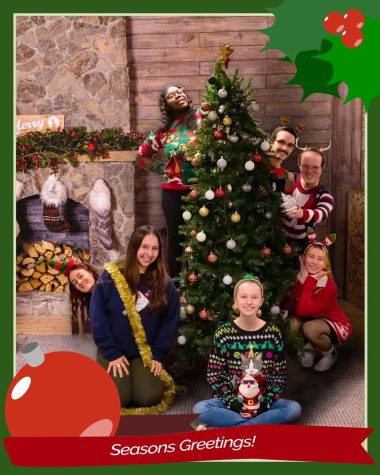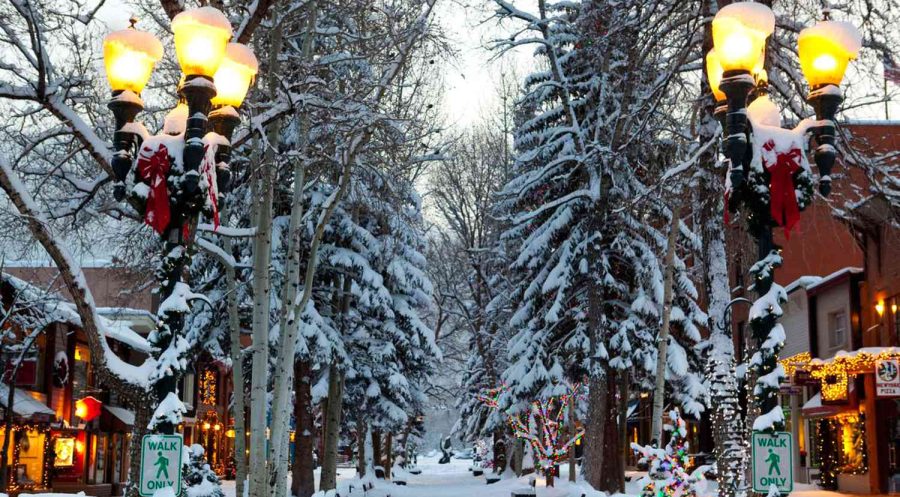History Behind the Holidays
November 17, 2022
The Holidays are used as a general term as are diversely celebrated by cultures and religions across the whole world. People begin breaking out the cozy blankets and decorations, preparing for celebrations and the start of a new year. Some groups find the holidays a spiritual event, while others utilize this time to spend with loved ones and gift-giving.
Winter Solstice
As the colder weather begins to set in, it gets closer and closer to the Winter Solstice. Unlike popular belief, the Winter Solstice is not the coldest day of the year but is an astronomical event that happens when the Earth is titled farthest away from the sun, resulting in becoming the shortest day of the year due to lessened daylight hours; representing the ‘return’ or ‘birth’ of the sun. This phenomenon occurs on Dec. 21 or 22 in the North Hemisphere and between July 20-22 in the Southern Hemisphere. The Winter Solstice was identified and became a celebration during the Stone Age to present day by a large variety of cultures, Nordic, Pagan, countries being the most well known to celebrate this event. Celebrations are very spiritual and many utilize this time for purification, rituals and decorating homes with greenery along with many festivals and occasionally gift-giving.
Kwanzaa
Kwanzaa gets a pretty bad rap compared to the other winter holidays. Usually it’s thought of as a joke to throw on top of the mountain of other days celebrated during this time. Honestly though, there’s a pretty meaningful story behind it. The holiday was created in 1966 by Dr. Maulana Karenga. So, the cliff notes are that it’s a celebration spanning from Dec. 26, to Jan. 1 that celebrates African American culture. Essentially, it’s an event based around traditions regarding the harvest within Africa. It’s a way to celebrate culture from the past that ends with a feast known as Karamu. There are seven principles dedicated to each day of the celebration known as “Nguzo Saba.” that are represented by Swahili words. These values are Umoja (Unity,) Kujichagulia (Self-determination,), Ujima (Collective work and responsibility), Ujamaa (Cooperative economics), Nia (Purpose), Kuumba (Creativity) and Imani (Faith).
 Three Kings Day
Three Kings Day
After the noise of the holidays comes to a lull and the commercials stop rolling on TV, one other holiday seems to slip through the gate. Three Kings Day Gives the new year a boost in joy and the start of generosity in others. For many Christians and Catholics in Latin American countries and Spain, the holiday season comes to an end on Jan. 6. The 12th day of Christmas when the three wise men come to baby Jesus and give him the gifts of gold, frankincense, and myrrh. This lovely epilogue consists of putting your boots out overnight and much like a certain corporatized jolly man’s holiday, a child wakes up to gifts and sweets the following morning. In addition to gifts, a sweet treat is expected to be seen that is specific to the holiday. Known as Rosca de Reyes or “Kings Cake.” This dessert is a symbolic pastry, shaped in a big circle to signify a crown worn by a king. This sweet bread holds a special surprise; when you cut into the cake you may have a chance of finding a little plastic figure that represents baby Jesus, whoever finds it is obligated to host the next party or holiday!
Hanukkah/Chanukah
Hanukkah/Chanukah is an eight-day Jewish celebration, also known as the Festival of Lights. The event begins each year on the 25th of Kislev on the Hebrew calendar – typically between mid-November and mid-December on the Gregrorian calendar. The Jewish holiday was first celebrated in 164 BC after the rededication of the Second Temple.
The Talmud (one of Judaism’s central texts) states that Judah Maccabee and the other Jewish folk involved in the rededication witnessed a miracle that gave way to Chanukah. They lit a candle that only had enough untainted olive oil to burn for one night, but the candle continued to blaze for eight nights. At the end of the eight nights, the people were able to replenish their olive oil supply. Now Chanukah is a time to celebrate and spend time with loved ones. Chanukah will begin the evening of Dec. 18th and continue through Dec. 26th this year.
Christmas Day
Christmas Day is what most kids would explain as their favorite day of the year. It begins with presents from Santa. Gifts can include clothing, toys, and food. According to research, Christmas was first celebrated around 336 AD. Christians all over the world used this holiday to celebrate the birth of Jesus. They also celebrated and continue to celebrate by spending time with family and friends, making cookies, opening gifts, and even singing traditional songs.
Christmas Eve is mainly celebrated for the birth of Jesus, a Christian holiday. In 1914 on Christmas Eve an amazing thing happened that night on the muggy, muddy Western Front trenches of WWI. German and British soldiers climbed out of their trenches and met halfway, they greeted each other with hand shakes and kindness. They exchanged songs, wine, tobacco and all joined in celebrating Christmas Eve in the cold at night. British machine gunner Bruce Bairnsfather wrote about it in his memoirs, he couldn’t believe his eyes. “Here they were – the actual, practical soldiers of the German army. “There was not an atom of hate on either side.” This was called the Christmas Truce, it is one of the most unusual moments of war in history.
For at least 4000 years, Millions have celebrated the beginning of the new year. Today, most New Year celebrations begin on the last day of the Gregorian calendar (Dec. 31). Popular traditions include attending parties, eating, making New Year’s resolutions, and watching fireworks. The most famous New Year’s tradition in the United States is the dropping of the giant ball in New York City’s Times Square when the clocks strikes midnight. This has been held almost annually since 1907. The custom of making New Year’s vows is believed to come from the ancient Babylonians. They made promises to gain favor of their gods and start the year off on a good note.









